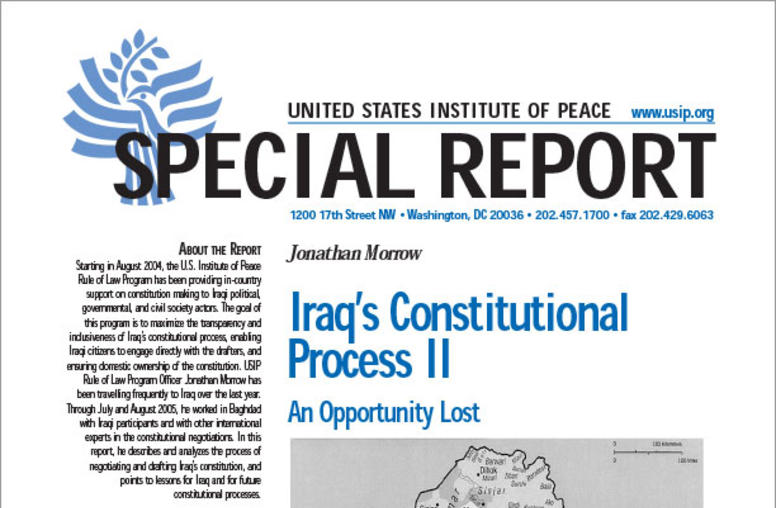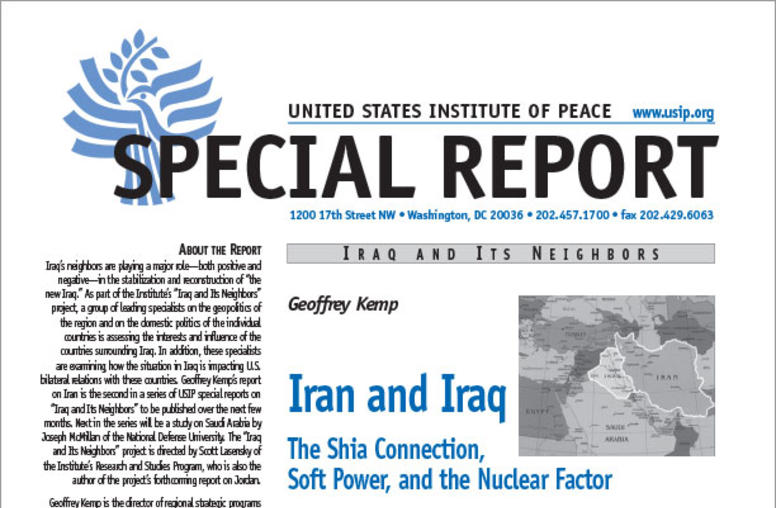Publications
Articles, publications, books, tools and multimedia features from the U.S. Institute of Peace provide the latest news, analysis, research findings, practitioner guides and reports, all related to the conflict zones and issues that are at the center of the Institute’s work to prevent and reduce violent conflict.
Emergent Insecurity in Eastern Sudan
A USIPeace Briefing recapping a meeting of the Institute's Sudan Peace Forum on the Beja people and the recent escalation of violence in Eastern Sudan.
Iraq before the Election: Constructing a National Narrative
This USIPeace Briefing recaps a recent Institute event that considered the potential outcomes of Iraq's upcoming elections and their implications for the future.
Syria and Political Change
This USIPeace Briefing recaps discussions at a recent seminar on the speculation of political change in Syria.
Iraq's Constitutional Process II: An Opportunity Lost (Arabic Edition)
Summary Even with the approval of a permanent constitution in the October national referendum, Iraq’s future is uncertain. Widespread Sunni Arab opposition to the new constitution has confirmed the existence of a fault line that profoundly divides Iraqi society. The Transitional Authoritative Law (TAL) envisaged a six-and-a-half-month, transparent, participatory, and orderly constitutional process. The TAL also provided the option, in Article 61(F), of a further six-month extension....
Belarus : Is a Peaceful Turn Towards Democracy Possible?
This USIPeace Briefing recaps a discussion on peaceful transition to democracy in Belarus and recent nonviolent revolutions in Georgia and Ukraine.

Iraq's Constitutional Process II: An Opportunity Lost
Summary Even with the approval of a permanent constitution in the October national referendum, Iraq’s future is uncertain. Widespread Sunni Arab opposition to the new constitution has confirmed the existence of a fault line that profoundly divides Iraqi society. The Transitional Authoritative Law (TAL) envisaged a six-and-a-half-month, transparent, participatory, and orderly constitutional process. The TAL also provided the option, in Article 61(F), of a further six-month extension....
Oral Histories: Afghanistan Provincial Reconstruction Teams (2004-2005)
The experiences of Americans who served in Provincial Reconstruction Teams (PRTs) in Afghanistan provide important lessons for current and future peace and stability operations. Provincial Reconstruction Teams are small, joint, civil-military organizations whose mission is to promote good governance, improved security and reconstruction. In November 2005, there were 22 PRTs in Afghanistan: nine were directed by the U.S. and countries belonging to the NATO-led International Security Assistance...
Six-Party Talks: Defining A Realistic Roadmap for Success
This USIPeace Briefing outlines points to guide preparation for the fifth round of the Six-Party Talks.
Lessons for the Future of Civic Resistance: Georgia and Ukraine
This USIPeace Briefing discusses lessons learned from nonviolent political change in Georgia and Ukraine.

Iran and Iraq: The Shia Connection, Soft Power, and the Nuclear Factor
Summary Predominantly Shiite Iran emerges from the aftermath of Saddam Hussein's fall with considerable power and influence in Iraq as Iraqis themselves struggle to acquire a semblance of unity and forge a new political order acceptable to Iraq's three key groups: Shia, Kurds, and Sunnis. Iran's leaders meet with Iraq's most influential personality, Grand Ayatollah Ali al-Sistani; American diplomats do not meet with Sistani. Iraq's new elected leaders make visits to Tehran and negotia...